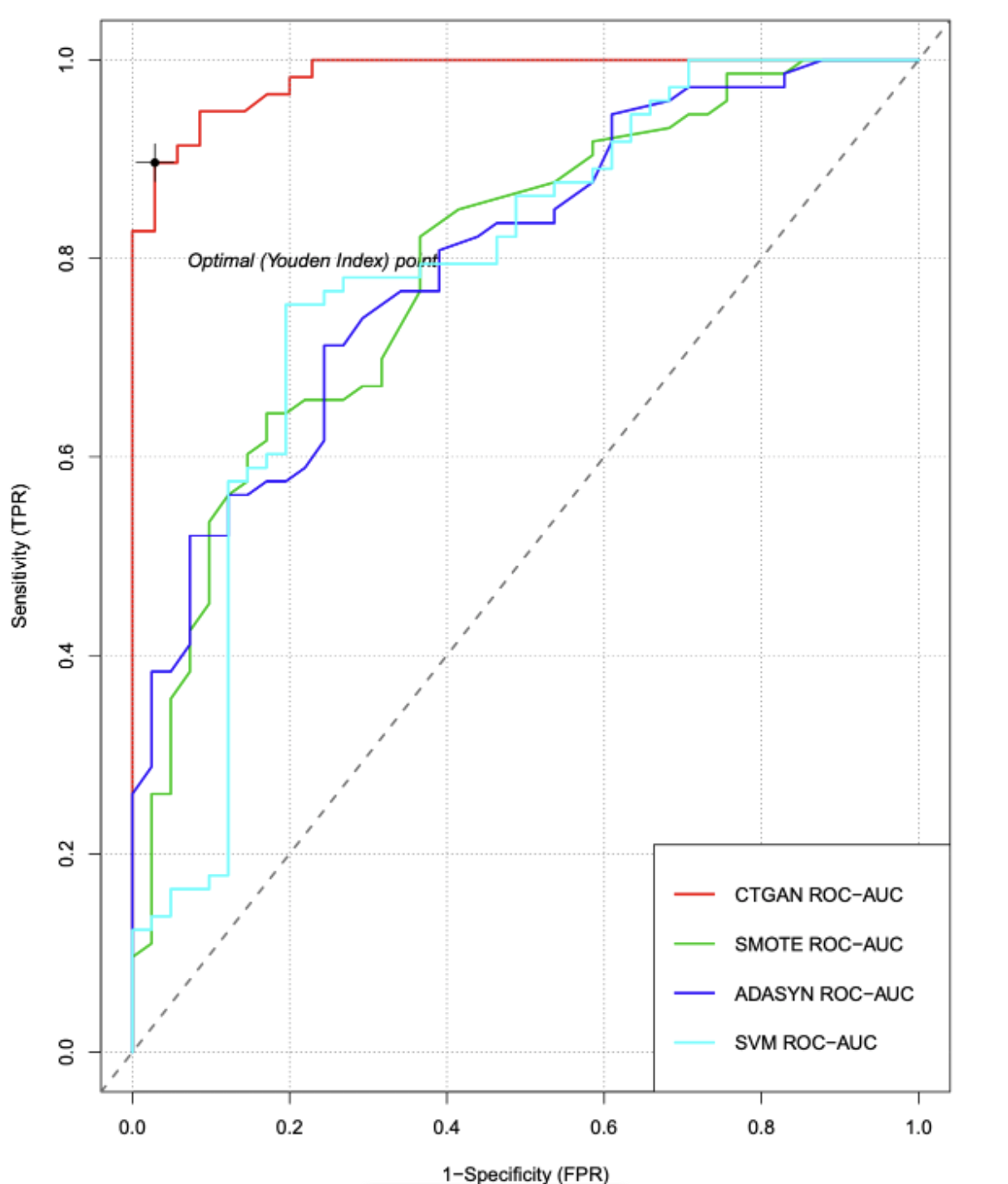Revolutionizing Clinical Diagnostic Models for Acute Rejection Using Generative Adversarial Networks
W. Yazar1, R. Nijor1, R. Sarwal1, N. Titzler1, M. Sarwal2, S. Ghosh1
1Nephrosant, Brisbane, CA, 2NephroSant, Brisbane, CA
Meeting: 2022 American Transplant Congress
Abstract number: 1795
Keywords: Graft failure, Kidney, Kidney transplantation, Renal failure
Topic: Clinical Science » Organ Inclusive » 72 - Machine Learning, Artificial Intelligence and Social Media in Transplantation
Session Information
Session Name: Machine Learning, Artificial Intelligence and Social Media in Transplantation
Session Type: Poster Abstract
Date: Tuesday, June 7, 2022
Session Time: 7:00pm-8:00pm
 Presentation Time: 7:00pm-8:00pm
Presentation Time: 7:00pm-8:00pm
Location: Hynes Halls C & D
*Purpose: Data heterogeneity, incompleteness and class-imbalance, hallmarks of real world healthcare data (RWHD), pose long-standing challenges to the accuracy of AI-based models. This research evaluates utilization of synthetic data to augment RWHD for improved performance of machine learning (ML) algorithms.
*Methods: Multiple urinary biomarker measures are combined via a ML model to generate a score prognosticating renal allograft rejection. This application highlights the power of an AI framework, where model training augmented by synthetic data generated via oversampling of minority class coupled with ML-based classification leads to optimal model performance. 309 independent biopsy matched urine samples – with class-imbalanced rejection episodes – from pediatric and adult renal allograft recipients across transplant centers with different protocols are included in this study. Multiple oversampling techniques: Generative Adversarial Networks(GAN), Synthetic Minority Over-sampling Technique(SMOTE), a SVM variant of SMOTE(SVM-SMOTE), and Adaptive Synthetic algorithm(ADASYN) coupled with ML classifiers: Random Forest, Light GBM and XGBoost are explored to identify the combination with optimal performance as evaluated via AUC analysis.
*Results: Results corroborate that Conditional Tabular Generative Adversarial Network(CTGAN) oversampling coupled with Random Forest classifier provides optimal accuracy(91%), sensitivity(95%) and specificity(91%) for models prognosticating early detection of kidney injury and functional decline. This outcome highlights the role of synthetic data in an AI-based approach; underscores that simple data aggregation to boost sample-size does not necessarily result in sufficient statistical power to optimize model performance. Our unique approach provides a novel method for enhanced AR biomarker performance classification.
*Conclusions: It’s imperative that the synthetic data recapitulate the underlying biological distributional complexities, observed in real data, while addressing the imbalances. Thus, effective, and appropriate use of synthetic data to supplement available RWD could achieve superior model performance, despite the limited availability and incompleteness of existing transplant patient data. Healthcare data and ML algorithms are both extremely valuable in our pursuit to move closer to a world where none suffer from inaccurate diagnoses. Early recognition of the failure of a kidney transplant for the diagnosis and treatment is just one element of that progress.
To cite this abstract in AMA style:
Yazar W, Nijor R, Sarwal R, Titzler N, Sarwal M, Ghosh S. Revolutionizing Clinical Diagnostic Models for Acute Rejection Using Generative Adversarial Networks [abstract]. Am J Transplant. 2022; 22 (suppl 3). https://atcmeetingabstracts.com/abstract/revolutionizing-clinical-diagnostic-models-for-acute-rejection-using-generative-adversarial-networks/. Accessed February 18, 2026.« Back to 2022 American Transplant Congress

